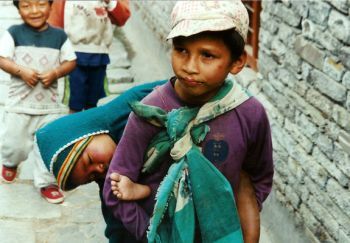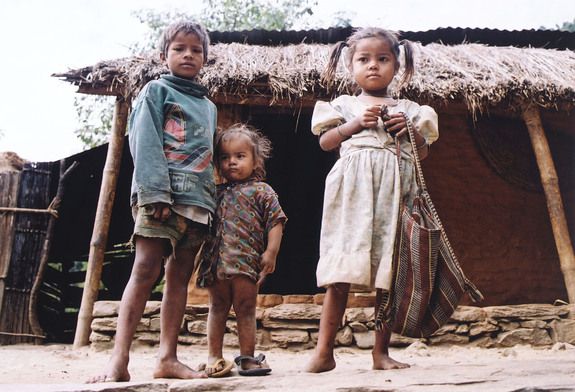
Publisher:
Bonnie King
CONTACT:
Newsroom@Salem-news.com
Advertising:
Adsales@Salem-news.com

~Truth~
~Justice~
~Peace~
TJP
Aug-19-2012 13:02

 TweetFollow @OregonNews
TweetFollow @OregonNews
Child Sex Tourism: Nepal Focus
Nancy Kamal Special to Salem-News.comIn the majority of cases child sex abuse go unreported.
 Visit: restlessbeings.org |
(LONDON) - There are many things that push people into doing things that they do not necessarily want to do. One of those things is poverty. And worst still, is if it is children who find themselves in this setting.
Tragically, “poverty is well recognised as a factor that increases children’s vulnerability to trafficking,” says Lena Karlsson – UNICEF child trafficking specialist.
Nepal, one of the poorest countries in the world, with almost 50% of the country population living under absolute poverty, is showing a growing trend of child exploitation namely with children who are forced to contribute economically.
“Every year around 5,000-7,000…girls are trafficked to different Indian cities for commercial sexual exploitation and thousands of other children are trafficked within the country for different labour exploitation.” - CWIN (Child Workers in Nepal).
In the majority of cases child sex abuse go unreported because of its stigmatic nature, even more so if they involve young boys. In Nepal, boys living on the streets are much more vulnerable to commercial sexual exploitation; some report that they are sexually abused and are used by foreign paedophiles operating in Kathmandu.
However one of the more alarming forms of mistreatment, as stated by ECPAT (End Child Prostitution, Child Pornography & the Trafficking of Children for Sexual Purposes), is child sex tourism.
Nepal is known for its lush landscapes, but that is not the only reason why some frequent the country. It is known that prostitution is intentionally used as an integral part of the package of tourist attraction, with the choice made by the authorities to deliberately turn a blind eye to what is happening.
 |
This is a perfect set-up for paedophiles and child traffickers and as a result it has been discovered that large international networks of paedophiles are visiting and often living permanently in Nepal.
According to CWIN, for cover-up some have opened “orphanages” and “shelters” for poor and neglected children. Paedophiles have then been active under these fronts, exploiting children on site. With poor children having very little authority or voice, combined with the police force that look the other way with foreign paedophiles, little has been done to tackle these abominable acts. It is by the efforts of external child rights organisations that during the period of 1995-2001 only eight paedophiles have been arrested and sentenced, with the most recent arrest of a British paedophile in Feb 2011 for housing and sexually exploiting children in a guesthouse.
But this is clearly still not good enough.
And now with the rise of ‘sex mafias’, reported in Mangalore, youth will be forced to comply or be on the receiving end of violent threats and consequences.
Evidence of the same atrocities can be seen in neighbouring countries too, for instance in Bangladesh where mostly street children fall victim to sexual exploitation. Permeated in all levels of the society, street children in Bangladesh are forced to engage in ‘theft, trafficked into sexual exploitation or bonded servitude and [fall victim to]... child sexual abuse.’ - UNICEF.
Relying only on themselves, children like Fatima have thus been forced to take matters into her own hands; like cutting her hair off to prevent pimps from realising she is a girl and thus be used for sexual exploitation. It need not be said that prevention is in the hands of the authority, not the vulnerable children.
Restless Beings are building a 'Village' in Dhaka to provide a home for a hundred of the most marginalised street children in Bangladesh to help shield them from such horrors – click to read more about the project.
The Village will present itself as a cost effective, successful model to the Bangladeshi government to show as evidence that the nations children can be saved.
And so similarly, Nepal, a country that has ratified to ‘The Optional Protocol on the sale of children, child prostitution and child pornography’, needs to take immediate action to give the children their rights back.
Conversely some organisations do not see it fit to solely blame the authorities for not detecting such activities. Prakash Shamra, Nepal country director of A Child’s Right, confirms that this is a rising issue but one that is also due to “…society, illiteracy and civilization. Authority can control this but cannot prevent it and control is not the solution but only symptomatic hiding.”
Looking at the root cause as well as clear implementation of the Optional Protocol needs to be on the agenda.
And since the country has recently started moving forward in the economy – World Bank states agriculture is no longer the main contributor to Nepal GDP but rather services are accountable for almost 50% of it – it needs now to invest in their biggest assets – the children of the country.
Related posts
All to Play for – An Olympics Legacy
 |
 |
 |
 |
 |
 |
 |
 |
Articles for August 18, 2012 | Articles for August 19, 2012 | Articles for August 20, 2012

Quick Links
DINING
Willamette UniversityGoudy Commons Cafe
Dine on the Queen
Willamette Queen Sternwheeler
MUST SEE SALEM
Oregon Capitol ToursCapitol History Gateway
Willamette River Ride
Willamette Queen Sternwheeler
Historic Home Tours:
Deepwood Museum
The Bush House
Gaiety Hollow Garden
AUCTIONS - APPRAISALS
Auction Masters & AppraisalsCONSTRUCTION SERVICES
Roofing and ContractingSheridan, Ore.
ONLINE SHOPPING
Special Occasion DressesAdvertise with Salem-News
Contact:AdSales@Salem-News.com

Salem-News.com:
googlec507860f6901db00.html

Terms of Service | Privacy Policy
All comments and messages are approved by people and self promotional links or unacceptable comments are denied.
[Return to Top]
©2025 Salem-News.com. All opinions expressed in this article are those of the author and do not necessarily reflect those of Salem-News.com.